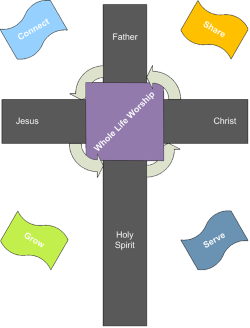Becoming a Woman of God
 Pastor Marty
Pastor Marty  Saturday, May 17, 2025 at 12:22PM
Saturday, May 17, 2025 at 12:22PM 1 Corinthians 13:11-13. This sermon was preached by Pastor Marty Bonner on Mother’s Day Sunday, May 11, 2025.
Today we are going to talk about maturity. Whether you are a young girl on the edge of womanhood, or a seasoned veteran, God has made you for the things that you will face.
I say this because we often feel like we are facing things that are too much for us. “I can’t do this!” We may say. However, it is often us simply being afraid or intimidated.
Let me just say that we do not need to worry about our ability to do it (whatever “it” may be) when we face these things. Yet, we do need to learn how to do it with God, in relationship with Him.
Let’s look at our passage.
The intimidating nature of maturity
In this passage, Paul is dealing with spiritual gifts within the Christian community that are being expressed in their meetings. In the middle of two chapters about spiritual gifts (chapters 12 and 14), he shows them that godly love is the foundation upon which any spiritual gift should be exercised.
Most of chapter 13 focuses on the necessity of love and what godly love looks like. However, at the end of the chapter (in our text), Paul uses the example of a child becoming an adult in order to make his point about spiritual gifts. This is a natural progression in the life of every person. When we reach adulthood, there are things that were a big part of our childhood that need to drop off. Conversely, there are things that are a part of our childhood that should never be cast off. He ties this back to the godly love that he has been calling them to do. Faith, hope, and love are intended to remain in the life of an adult.
Of course, Paul’s point is not about natural maturity. He isn’t even talking about spiritual maturity in our lives, though that is an element here. Paul sees this life, where Christians are living mortal lives by the power and leading of the Holy Spirit, as the childhood of our eternal life. At the resurrection, we will enter into the adulthood phase of our experience. There are things in the spiritual life of this age that are God-given, necessary components for now, but they will no longer be needed when we step into the perfect relationship with God the Father and His Son that will be experienced then.
Let’s pull on this maturity angle a little more.
Every child faces the intimidating nature of the maturity process. Some can’t wait and rush into adult things. Whereas, others are reticent and slower at moving forward. Both types face feelings of being in over their head, or even paralyzing moments that can keep us from starting, or finishing.
We need to see God’s signature in the fact that the things we were made to do are intimidating to us. The things we were made to do will require us to become greater than we are now. However, it is not something that you go to school in order to be trained. Working a job and providing a place to live takes discipline that few teenagers have. However, everyone of those teenagers (short of a debilitating condition) were made with the capacity to grow into a person who can do that. Things like schooling, work, marriage, having children, and even growing old, can be given preparation, but the preparation will not make those things easy. The things themselves cause us to grow, to mature, to become more than we were before.
A young person is not yet equal to the task before them, but they will grow as a person as they trust God and walk forward into the task. Part of maturity is discovering just how childish our thinking is about adult things. Reality crashes into the infantile notions in our head. This helps us to mature.
Why do we have a society of people, young and old, who are kicking against reality? Less and less kids have had an adult model maturity in a good way. The supports in our society that used to encourage kids to move forward are all but shot. Kids need good examples of moms and dads, grandmas and grandpas, teachers and bosses who can example to them a proper response to these difficult things. The active parenting of a mom and dad are meant to come off, like training wheels. However, this analogy loses the idea of a relationship that has matured into something greater.
Long before a kid knocks on the door to adulthood, they have discovered that they have weaknesses and shortcomings. Some of these are physical. They can be permanent, but many are taken care of by physical maturation. Other weaknesses will have to do with character.
In fact, physical maturity acts like a sort of deadline. It will happen whether you are ready for adult life or not. All children need to be taught about the God who loves them and provides help for their failings. They need to know that they can go forward even when things are not perfect yet. Notice the transition in our text from verse 11 to verse 12. This life is the childhood of eternity. We are not yet what are going to be. We are in an imperfect time. Paul is recognizing that things are not perfect in this life, but God has made a way for us through Jesus. The Corinthians were pursuing something that seemed to be the perfect in their mind. But, they were thinking like kids. Their understanding of what God was doing in them in this mortal life needed to grow. Spiritual gifts are for this life, not the next. What is important is to do them by the love of God and for His purposes.
Paul doesn’t touch on this, but you can rest in God’s design even when life is going along faster than you desire. Just like physical maturity presses the issue in our adult matters of this life, so it will continue to push us to the edge of death and beyond. Like any deadline that is along way off, we can spend little time thinking about it, until it is knocking on our door.
Adults need to empathize with kids going through this transition, just as we all should empathize with people who are transitioning from this life to the next. The biggest thing we can do for one another is to love one another with the love described in this chapter, God’s love.
I hope that you are hearing the truth that you can face these things and rest in the fact that God has designed you for them. You are not the one who just can’t do it. Don’t dwell in the land of anxiety and worry. Instead, rest in God’s wisdom and foresight.
The need for maturity in natural things
We need to mature in body, in mind and in interpersonal relationships. When we talk about anxiety, we are recognizing the internal development of our heart and mind. We need to grow in emotional maturity as well as cognitive maturity. In fact, the things that we feel and think will naturally change (hopefully mature) as we grow older. However, we can hit roadblocks in this.
Some people did not grow up with the ideal situation. God intended that a child be produced in the context of a man and woman who love each other with a godly love and are committed for life to one another. The child is meant to be born into a home of love that expands to make room for them out of love. This will help the child to mature in many ways.
Yet, a kid doesn’t have to have a “perfect situation” in this world in order to mature in body, mind and social skills. Many people have come out of very bad situations, and yet chose to live differently. Other people’s poor choices do not have to rule our life. Oh, they will impact us, but they cannot take our decision to grow up in body, mind and relationships.
Paul is writing to the Corinthian Christians who were having a lot of maturity issues between themselves. Some respond to such a problem through isolation. However, God did not make us to be alone. Even an introvert is merely a descriptor of those who are more internal than those who are external-oriented. They are both in relationships. In fact, we are not equipped to do life alone, and the human race would die out in one generation if we all chose the alone path.
Mother’s Day emphasizes those women who have come into a relationship with a man and have given birth to a child. This is God’s design, and it works best when the parents love the child from the context of their own loving relationship.
Though the majority of men and women are “wired” for marriage, there are some who are not. Yet, even the celibate life is not lived alone. We are designed to be in appropriate loving relationships with others.
As you mature physically, emotionally, mentally and socially, the supports that were there in your childhood are being removed. Some happen fast. However, some happen slow.
The hardest support to face is that of the people who have loved you in your life. In general, people face the passing of their grandparents, then their parents. It will eventually become our turn. This is always a challenge. The child is destined to become the parent, then the grandparent, and then a memory. It is the wisdom of God that has determined to use this imperfect time in order to bring us to the perfect that He has for us. He is using the imperfect to perfect us for perfection.
The recognition of this requires us to step into the moment of each stage. We put behind us childish things and take hold of the adult things. We can fully engage, not because we are perfect, but because we can trust that God has provided for us all that we need. It is not all up to you. God is with you every step of the way. Learn to rest in Him, but also trust in Him as you embrace each stage.
The need for spiritual maturity
This brings us to spiritual maturity. There are many people who have matured and learned to interact socially with a minimum of adverse effects on others. This is good, but we need more than socially adjusted people.
In verse 12, Paul compares this life to the life that will be when the righteous are resurrected and Christ returns. This life is partial, imperfect. The life to come will be perfect or complete. In this life, we see God and life itself as if through a dim mirror. But, in that day, we will see God face to face.
It is important for every adult to recognize that they are called to be a spiritual child in the care of a Heavenly Father. All of this is headed somewhere greater than what we see today. No child can fully comprehend the life of an adult. So, it is for us thinking about the next stages with Christ. God has a perfect plan to use these imperfections to bring us to a perfect place by His help.
This brings us full circle. You were made to be like Him, to image Him. There are some ways that a child becomes like their parents without any thought. They begin to look more like them and take on their mannerisms, ways of thinking, etc. However, other things require work.
Being made in the image of God means that we are designed to reflect God to the world, to the universe, around us. Yet, sin has impacted our ability to do this. Through Jesus, God has made it possible for us to become like Him, little by little, until we are completed in the resurrection. We live this life with imperfection being perfected by God’s help, but we will not be perfected until that day Paul is talking about.
This is where we come to realize that this life is a childhood to the adult life in Christ to come. We won’t be doing church like we do today in the Millennial kingdom, but we will walk in love, faith and hope. In that age, we will put off the childish things of this age. They are entirely good for now, but fully inadequate for the age to come. Christ will lead us in taking on the adult things.
If we only look at this world, then it is easy to lose hope and to lose faith. Just as you can trust God’s design in you as an individual, we can also trust God’s design behind history. He knows what He is doing. Humanity will step into adulthood through the grace of Jesus Christ.
Paul ends with the point that some things do not change from childhood to adulthood. Faith, Hope, and Love are the foundational aspects of every phase in which God has been dealing with humanity. We must never let the things we do that are only temporary overwhelm the more important permanent things. Live life out of a mutual relationship of love, faith, and hope between you and God, as well as you and other people!



